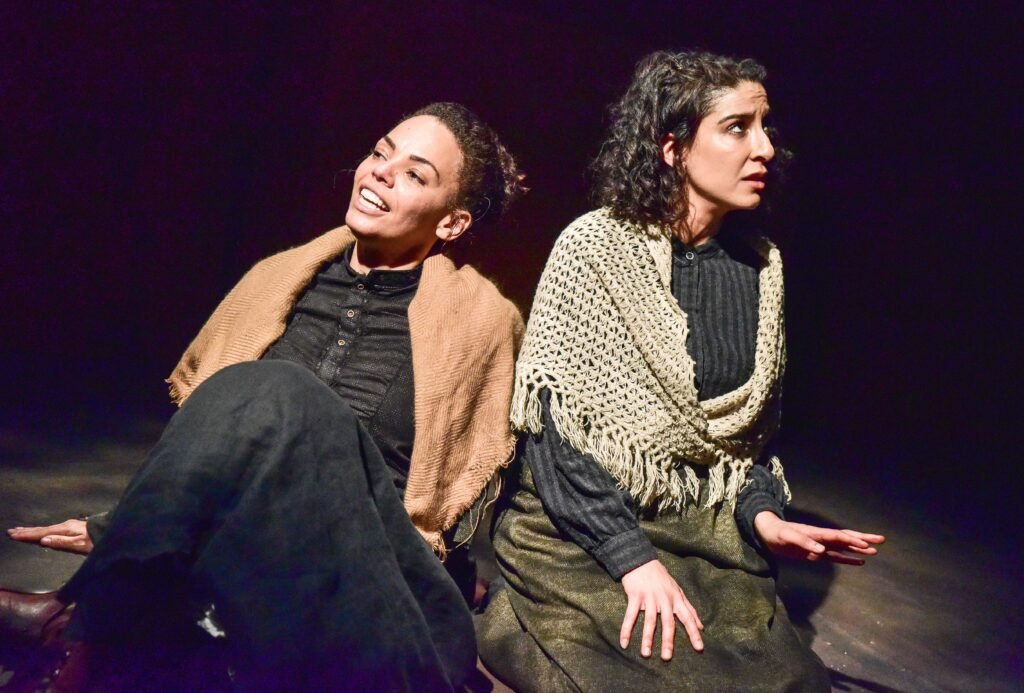The Origins of Folk Music
“When I was a girl I used to walk up the lanes and listen to the birds and I’d make tunes from their cries. And I shared a bed with my sister and when the rain fell we’d hear it on the iron roof.”
Louie

Nell Leyshon is known for her work centred on the English countryside. In her new play, Folk she looks at the heritage that is Folk Music and one of the first people to keep it alive and pass it on in writing to future generations. Set in Somerset, two women outworking as glovers were sung to by their mother and as they sewed, they learnt her songs.
The younger sister Louie (Mariam Haque) takes a job for a week as a maid to look after a man Cecil Sharp (Simon Robson) lodging at the local vicarage. Sharp, once a lawyer, is in 1903 in charge of a London Conservatoire and has come to Somerset to write down as many folk songs as he can gather in the countryside.
Sharp hears Louie singing and there begins a joint purpose, for her to sing and for him to write down the musical notation and the words of her songs. Louie has a bad leg which means she limps and she hasn’t been to school so she cannot read or write. She is fascinated by Sharp’s playing of the piano and musical script.
Louie unused to company has a very matter of fact way of talking, a naturalness with no sign of deference to her employer which can sound belligerent. “The Seeds of Love” sung by Lucy’s friend John England (Ben Allen) collected in Hambridge on 22nd August 1903 is romanticised in folklore as the golden moment when this period of collecting begins.
Faced with great composers from Germany, France, Italy, Norway and elsewhere in Europe, Sharp wants to inspire a revival in interest in English folk music by composing new work around these old tunes. I was wondering when sound recording became a possibility after Edison and the invention of the phonograph in the 1870s. The answer is that quality recording wasn’t developed until the 1940s and in 1942 Louie Hooper recorded for the BBC Radio her memories of meeting and working with Mr Sharp.

The transactional relationship between the academic and the country girl at its simplest is that she knows the tunes and he needs them. He publishes a collection in a book and the only reward Louie gets is a copy of the book with a very slight reference to herself. Sharp offers her the opportunity to sing in public but he doesn’t understand Louie’s limitation and lack of social confidence.
The author hints in an interview in the programme that there were many things she left out of her play, that `we would not appreciate in Sharp’s writings, his racism, his misogyny and his consciousness of his own status. Certainly what we do hear from him is the thread of a rise in nationalism and belief in Englishness and its intrinsic value.
This is the period before the First World War. Industrialisation and the use of machinery threatens the glovemakers’ livelihood, with factory work as the alternative to working from home. Appreciate the irony! John and his brother look to Canada for better prospects.
The acting performances are strong and both women Sacha Frost as Lucy and Mariam Haque as Louie sing unaccompanied and powerfully which brings a few of the folk songs to magical life. We also get a stamping dance to “Blow Away the Morning Dew”. The set is a pretty painted backdrop of the wonderful colours of the woods, inhabited by roe deer and birds and art nouveau in style. The piano is unwrapped in Sharp’s lodging and wrapped in the glovemakers’ cottage. I’m not quite sure what today’s message is from Roxane Silbert’s choosing of this play but certainly during lockdown we learnt to value nature more, countryside and appreciate birdsong.

Production Notes
Folk
by Nell Leyshon
Directed by Roxane Silbert
Cast
Starring:
Ben Allen
Sasha Frost
Mariam Haque
Simon Robson
Creatives
Director: Roxane Silbert
Designer: Rose Revitt
Musical Arranger and Director: Gary Yershon
Lighting Designer: Matt Haskins
Sound Designer: TingYing Dong
Information
Running Time: Two hours with an interval
Booking to 5th February 2022
Theatre:
Hampstead Theatre Downstairs
Eton Avenue
Swiss Cottage
Tube: Swiss Cottage
Reviewed by Lizzie Loveridge at
Hampstead Theatre Downstairs
on 4th January 2022

